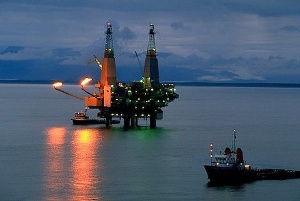Ghana’s third oil and gas field, the Sankofa-Gye Nayame Field, will be a game-changer in the development of the country’s gas industry, the Acting Chief Executive Officer of the Ghana National Petroleum Corporation (GNPC) has said.
Alex Mould stated that within one year significant progress has been made, though “there is much more to do”.
The project was secured by GNPC alongside other state institutions as part of efforts to improve the energy sector.
When completed, the Sankofa-Gye Nyame Field is expected to produce 180 million standard cubic feet of gas daily, sufficient to generate approximately 1,100 megawatts of electricity, according to authorities.
First gas is expected in February 2018, in addition to 30,000 barrels of oil daily, to be produced from August 2017.
The Floating, Production, Storage and Offloading (FPSO) vessel, which is expected to be used for oil extraction, is more than half-way complete and on Tuesday, 26th January, 2016 sailed out for the Keppel Shipyard in Singapore for integration of the oil and gas processing modules.
It had undergone conversion and life extension at the HRDD shipyard in China, to meet the 20-year life of the field, without dry-docking (moving to a shipyard) for maintenance.
It is expected to be completed and set sail to Ghana in the first quarter, 2017.
Speaking at a ceremony to set sail the vessel, Mr Mould expressed satisfaction at the progress made so far.
“We will continue to collaborate with these institutions, and in addition, provide access to use of project equipment, machinery and vehicles, to ensure successful delivery of the project.”
He said GNPC is poised to provide the necessary investment for the completion of the project.
“Investments in the construction of gas export pipelines to be integrated with the Ghana Gas pipelines, together with onshore receiving facilities are necessary to ensure efficient supply of fuel to improve Ghana’s energy capacity. This will help provide electricity to households, schools, hospitals and businesses, and fuel Ghana’s economic development.”
The project undertaken at a cost of $7.9 billion is the largest ever foreign direct investment into Ghana.
Business News of Monday, 1 February 2016
Source: tv3network.com

















